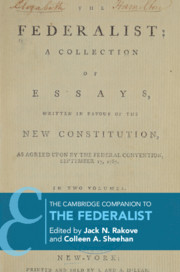Book contents
- The Cambridge Companion to The Federalist
- Other Volumes in the Series of Cambridge Companions to Philosophy
- The Cambridge Companion to The Federalist
- Copyright page
- Contents
- Contributors
- Acknowledgments
- Abbreviations
- Introduction
- 1 Publius and the Anti-Federalists:
- 2 John Jay, The Federalist, and the Constitution
- 3 “A Vigorous National Government”: Hamilton on Security, War, and Revenue
- 4 “The Known Opinion of the Impartial World”
- 5 The Federalist’s New Federalism
- 6 The Political Psychology of Publius
- 7 Montesquieu, Hume, Adam Smith, and the Philosophical Perspective of The Federalist
- 8 Madison’s Republican Remedy
- 9 The Republicanism of Publius
- 10 “The Interest of the Man”: James Madison’s Constitutional Politics
- 11 Politics Indoors and Out-of-Doors
- 12 “The Cool and Deliberate Sense of the Community”
- 13 Publius on Monarchy
- 14 The Genius of Hamilton and the Birth of the Modern Theory of the Judiciary
- 15 Publius’s Political Science
- 16 The Republican Form of Government in The Federalist
- Index
- Other Volumes in the Series of Cambridge Companions to Philosophy
13 - Publius on Monarchy
Published online by Cambridge University Press: 28 February 2020
- The Cambridge Companion to The Federalist
- Other Volumes in the Series of Cambridge Companions to Philosophy
- The Cambridge Companion to The Federalist
- Copyright page
- Contents
- Contributors
- Acknowledgments
- Abbreviations
- Introduction
- 1 Publius and the Anti-Federalists:
- 2 John Jay, The Federalist, and the Constitution
- 3 “A Vigorous National Government”: Hamilton on Security, War, and Revenue
- 4 “The Known Opinion of the Impartial World”
- 5 The Federalist’s New Federalism
- 6 The Political Psychology of Publius
- 7 Montesquieu, Hume, Adam Smith, and the Philosophical Perspective of The Federalist
- 8 Madison’s Republican Remedy
- 9 The Republicanism of Publius
- 10 “The Interest of the Man”: James Madison’s Constitutional Politics
- 11 Politics Indoors and Out-of-Doors
- 12 “The Cool and Deliberate Sense of the Community”
- 13 Publius on Monarchy
- 14 The Genius of Hamilton and the Birth of the Modern Theory of the Judiciary
- 15 Publius’s Political Science
- 16 The Republican Form of Government in The Federalist
- Index
- Other Volumes in the Series of Cambridge Companions to Philosophy
Summary
The eleven essays published by “Publius” between March 11 and April 4, 1787 jointly constitute the most famous defense of presidential power in the American constitutional tradition. It is here that Alexander Hamilton extols “energy in the executive,” along with the canonical litany of “decision, activity, secrecy, and dispatch.” Such energy, for Hamilton, requires “unity” in the chief magistracy, the focus and coherence of a single mind (Fed. 70, 471–472). But it equally demands “firmness” – a readiness to exert oneself in defense of the “constitutional powers” of one’s office – which can only be expected from those whose “duration in office” is sufficiently long. “It is a general principle of human nature,” Hamilton explains, “that a man will be interested in what he possesses, in proportion to the firmness or precariousness of the tenure, by which he holds it.” Only a magistrate who regards his office as truly his own will subject himself to danger or opprobrium in order to secure the system of which it is a part – and this he must routinely do. For while “it is a just observation that the people commonly intend the PUBLIC GOOD,” they do not, alas, always “reason right about the means of promoting it.” An effective, energetic executive must accordingly wield his prerogatives to tame their episodic folly; to “withstand the temporary delusion, in order to give them time and opportunity for more cool and sedate reflection.” The republican principle may require deference to “the deliberate sense of the community,” but it “does not require an unqualified complaisance to every sudden breeze of passion, or to every transient impulse which the people may receive from the arts of men, who flatter their prejudices to betray their interests” (Fed. 71, 481–82).
- Type
- Chapter
- Information
- The Cambridge Companion to The Federalist , pp. 426 - 463Publisher: Cambridge University PressPrint publication year: 2020



